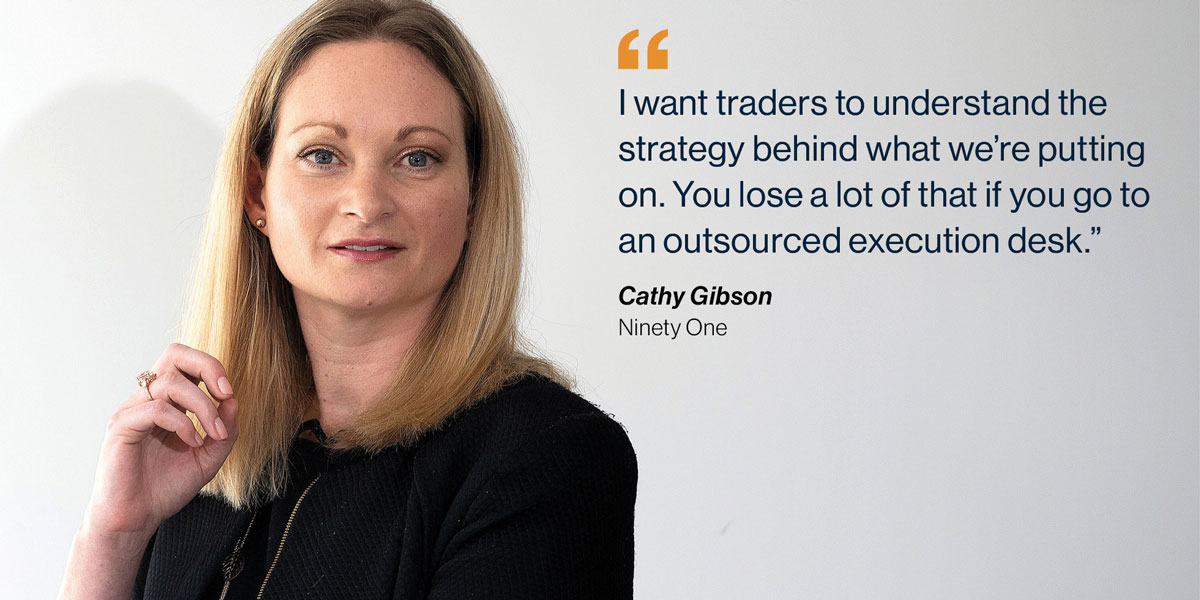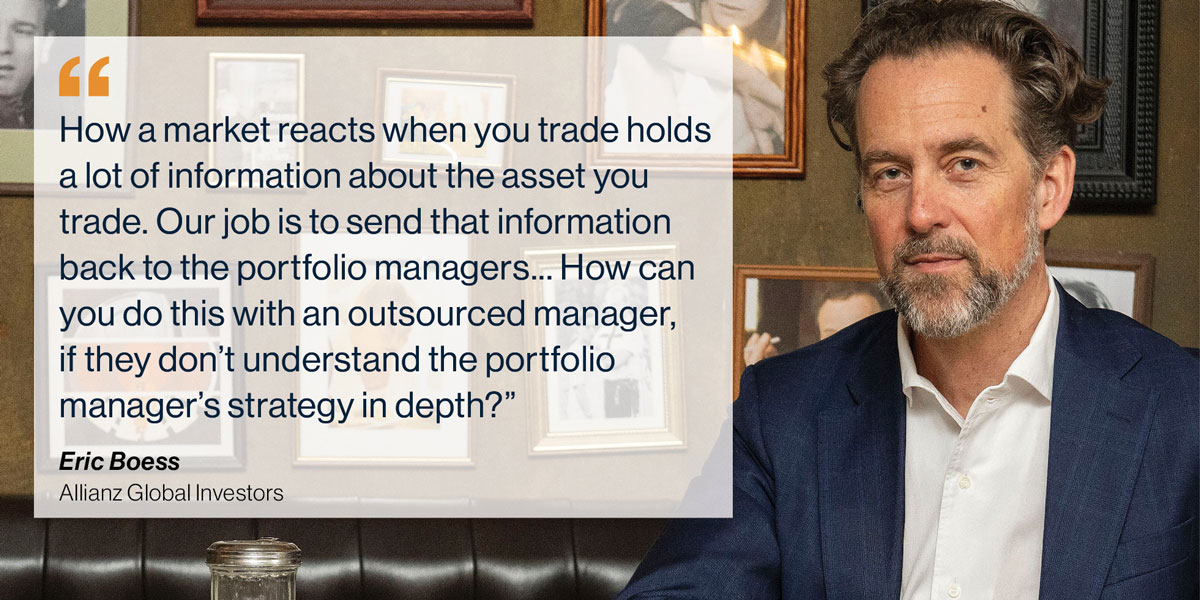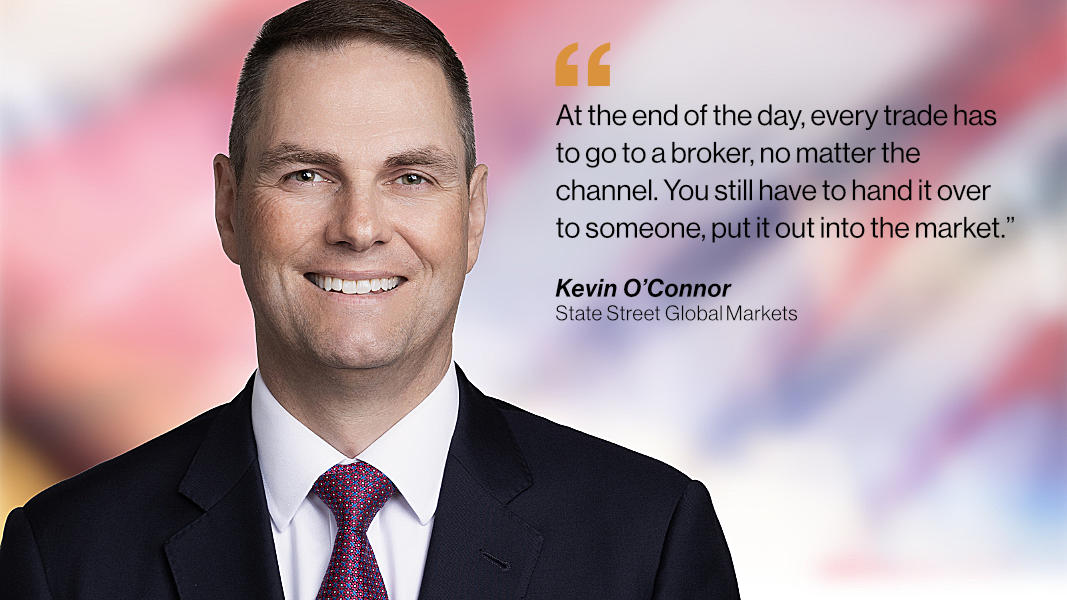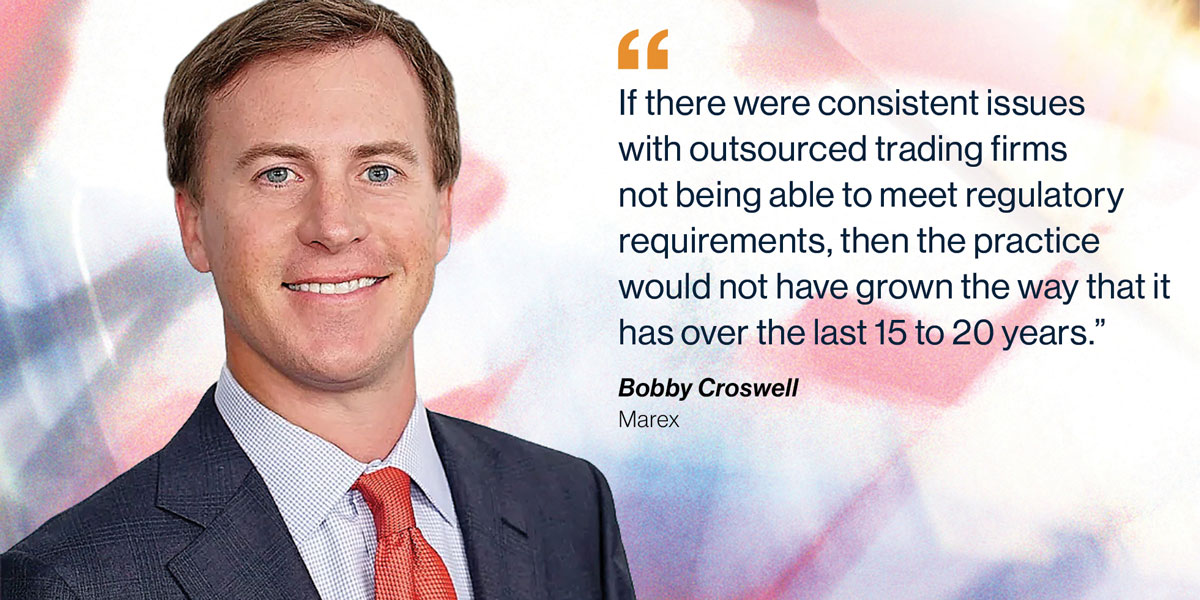While it’s not a new concept, outsourcing has been growing in popularity over recent years. The ability to delegate aspects of the investment process to a provider has freed up time, money and crucial resources for funds with increasingly stretched budgets. Like any solution, though, it’s not a magic bullet. There are times when buy-side clients see the service as a risk rather than an efficiency gain, and even some providers admit that there are times when keeping things in-house is the smarter move.
UBS’s shock exit from the outsourced trading space in March reinvigorated questions of whether outsourced trading is worth it – for both vendors and clients. Global Trading spoke to several buy-side firms, many of whom wished to be kept anonymous, about what they really thought of the practice.
Investment without trading
Handing over trading control to a third party is a complex decision to make, potentially far more serious than proponents suggest. Some also think that outsourcing trading removes an integral component of a company’s purpose, eroding the sense of a group trading strategy and ethos.
“I want traders to understand the strategy behind what we’re putting on,” explained Cathy Gibson, global head of trading at investment manager Ninety One. “The traders understand the underlying strategies behind what we’re doing,” she said. “They know if a particular portfolio manager is very price sensitive and wouldn’t want them to continue purchasing into a rising market, for example. They can add value there. You lose a lot of that if you go to an outsourced execution desk.”

“An important part of alpha is market colour. How a market reacts when you trade holds a lot of information about the asset you trade,” affirms Eric Boess, global head of trading at Allianz Global Investors. “Our job is to send that information back to the portfolio managers who are interested in it. How can you do this with an outsourced manager, if they don’t understand the portfolio manager’s strategy in depth?”
The head of trading for a large UK asset manager added that as markets become increasingly complex, the importance of trading within the investment process will only grow in tandem. Outsourcing may be more convenient now, but it makes little sense to jettison such a critical component of a business from an efficiency or brand-reputational angle.
Kevin O’Connor, global head of portfolio solutions sales for State Street Global Markets, contends that the situation is more nuanced than outsourcing everything or nothing. “There are some traders who outsource easier trades so that they can focus on the difficult trades and there are some traders who prefer to outsource more difficult trades in instruments or in markets that they don’t trade every day,” he said.
“If a trader really feels that they can add value to the trading process while working with their trusted counterparties, then that trader is going to want to trade that instrument themselves rather than outsource to another trader. “If I was a trader who really felt that they could add value to the trading process, I wouldn’t outsource a trade if I thought I could do it better.”
All-in on efficiency
The chief operating and financial officer at a boutique New York long-short equity fund, and a Marex outsourced trading client, told Global Trading that the choice between hiring an in-house trader and going to a provider came down to two key points: time and money.
“It’s definitely cheaper for the management company to outsource the trading function than hiring someone internally,” they said.
Then there’s the geographic element. “We trade globally, and it’s helpful to have an outsourced team that sits in other parts of the world, versus one trader sitting here in New York who is sleeping while some of the markets are open,” the executive continued. “When we launched, we’d be asleep when orders we worked were completed. It wasn’t ideal.”
“Also, there’s additional complexity when trading in global markets. In the US, we can just trade in cash. It’s pretty straightforward. But in certain overseas markets, you’re required to trade on swaps. Having trades that are partly in cash, partly in swaps is cumbersome for a portfolio manager, who shouldn’t be spending their time figuring out how to enter an order on swap in one market and in cash in another.”
Having a specialist in place to handle these complexities both frees up time and increases efficiency.
A modular approach to outsourcing is also popular, by which firms can break into new asset classes without having to grow their internal team.
“At larger funds and banks that I used to work at, I saw the execution desk would cover the execution of a lot of different asset classes. They were spread very thin, and didn’t have the feel or understanding for a particular product,” Martin Bercetche, chief investment officer at emerging markets credit investment firm Frontier Road and a Marex client, recalled. Bringing in a product specialist can improve execution quality and allow investment ideas to be realised, he suggested. “I think a larger institution would probably have more incentives to adopt an outsource model.”
“Based on the results of our Outsourced Trading Survey, mid-sized firms between US$30 billion and US$50billion in AUM reported reduced transaction costs as a key cost consideration whereas larger firms reported more cost savings on infrastructure cost,” O’Connor responded. “Between execution and order management, risk management, compliance, booking and settlement systems – the infrastructure can become expensive and can eat into your investment performance,” he explained.
Gibson added that geographically outsourcing may be a good choice for larger managers – particularly as settlement cycles shrink.
“If a firm is heavily concentrated in one time zone but has a small percentage of their assets trading in another, then even for a large manager it might make sense to add an outsourced trader to the team,” she said.
This is something she has observed since the US moved to T+1. “Outsourcing FX execution increased because all of a sudden managers without trading functions in US time zones needed to cover T+1 FX at the end of the US session,” she explained. “It’s not necessarily cost efficient to open a trading desk in a region solely to cover late night FX flow.”
This is exactly the argument that outsourced trading providers use; the burden of operating a new trading desk can be reduced significantly with a little help, and might even make the less-optimised execution worth it. Big-name firms like Goldman Sachs Asset Management have outsourced elements of their trading to BNY Mellon, fuelling the pro-outsourcing crusade.
Cons
None of these statements are unexpected; outsourced trading is popular for a reason, and its successes are widely publicised. On a pure cost level, it’s indisputable that outsourcing saves money in the immediate term. However, other market participants are sceptical of the benefits to companies beyond boutiques.
The equity COO warned that bigger firms may become fragmented with an outsourced approach. “If you’re trading global markets, does that mean you’re going to hire a trader to sit in Hong Kong when you’re based in New York? Trading teams typically sit together, work together. At a certain size there might be some comfort in having an internal team.”
“There are certain advantages to having an internal trader that are difficult to achieve without them.”
One of the main drawbacks of outsourced trading is also one of its main features: the hired traders are not on the ground with the rest of the team.
“An internal trader being involved in direct communications with the various desks can build a rapport, and could get us better information than if we ask our outsourced trader to go and find out about this or that name. The relationship-building piece is intermediated with the outsourced trader,” an equity fund executive noted.
More broadly, poor communication can limit execution success. “Knowing the market view and positioning, where the sellers and buyer are, is a very important part of the investment thesis,” Bercetche told Global Trading. “If the execution desk doesn’t properly reflect that information back to the portfolio manager, back to the investor, then part of the investment decision gets lost.”
As Boess put it: “Are they working in your name or theirs? They will have a large number of clients they serve. We have good relationships with some of our larger brokers – can you have those if you’re going through an outsourcing provider?”
Regulatory consequences?
Aside from suboptimal outcomes, some are concerned that outsourced trading’s dangers could be more drastic – to the tune of regulatory breaches.
Traders need to be aware of any restrictions on what they can trade, either in line with universal regulations such as the SEC’s Regulation M, which prevents firms from participating in an IPO if they’ve shorted the stock in the five business days prior, or individual companies’ requirements.
This is usually established in the pre-trade process, but could be missed between organisations. “If our portfolio manager Bloomberg Chats the outsourced trader to trade a name that’s on our restricted list, how do we know that the outsourced trader has it on their restricted list? I don’t know if all firms and traders are completely buttoned up on this,” an equity COO noted.
“I’m not sure that the outsourced trader is necessarily incentivised or even motivated or concerned about the manager’s regulatory issues. They’re just entering orders — it’s not their responsibility,” another executive said.
Clients must govern their outsourcing providers with the same rigour that they do their own desks, one head of trading said. As such, they were sceptical of whether the savings outsourcing brings are as good as they look.

“The national competent authority will look at your trades irrespective of whether they’ve been executed on a proprietary system or through an outsourced trading provider, and one of those is easier to monitor,” Boess adds.
Bercetche is less bothered about the issue. “A best execution definition is something that would have to be agreed on before outsourcing trading,” he said. “As long as the execution desk understands what that threshold is, I don’t see any regulatory issues at all.”
However, “if there were consistent issues with outsourced trading firms not being able to meet regulatory requirements, then the practice would not have grown the way that it has over the last 15 to 20 years,” argues Bobby Croswell, co-head of Americas prime brokerage sales, outsourced trading and capital introduction at Marex.
It is important to note that regulators are not focusing their efforts on these perceived problems, and that there have been no public prosecutions of providers or clients for poor outsourced trading practices. Regardless, security, compliance and trust anxieties abound.
“There are definitely some concerns about Chinese Walls that need to be checked before engaging with an outsourced trading partner,” the equity COO said, referring to information barrier protocols within organisations. “Are our orders being commingled with other clients? How do we know that the information being shared with the sell side is in our best interests? Is there any component of frontrunning?”
Gibson voiced a similar point. “Consolidating my order flow with another large asset manager’s and ending up with my trades being stuck behind theirs does not benefit my client. I don’t want my orders to be in a queue for execution.”

O’Connor counters that all trades are handed off at some point in the execution process. “At the end of the day, every trade has to go to a broker, no matter the channel. You still have to hand it over to someone, put it out into the market.”
Croswell concurs. “We’ve never had a client concerned with information leakage in terms of working with our outsourced trading desk,” he said. “Marex, as a whole, doesn’t have a large equity sales trading operation like some of our competitors. Our desk is agency only.”
However, it still all goes back to money and motivation. Outsourcing providers can, in some ways, afford to be less driven in their trading practices, less invested in their trading outcomes. Despite their assurances to the contrary, with Croswell attesting that “our interests are fully aligned with our clients,” the buy side is not yet fully trusting of their intentions.
Where’s the money?
The more popular outsourcing pricing model, according to Croswell, is the service fee model. With this approach, a commission is tacked onto a client’s rate with the street.
For prospects and clients, “we have an out-of-the-box pricing model, but it isn’t always used. It’s typically negotiated for higher volume clients and whether high- or low-touch trading is used, among other things,” Croswell explains. “Not everyone is going to get the same pricing.”

Just as pricing is ambiguous, it’s safe to say that firms providing outsourced trading do not like to disclose their revenues. There’s also a hesitancy for providers to shout about their client wins. Many users do not wish to be identified publicly, making it difficult to gauge the true scope of the space. Although the perks of the practice are well-publicised, just how much companies are making from their lauded outsourcing services is under wraps.
What is clear is that revenues are increasing at some of the largest providers.
Northern Trust, which states that its number of outsourced trading clients has more than doubled over the past five years, saw a 12% hike in ‘trust, investment and other servicing fees’ over the year, reaching US$1,222.2 million. In the last year, Ned Group, 2X Ideas, Artemis Investment Managers, Waverton, and True Potential have all selected the provider of outsourced solutions.
Marex, which acquired TD Cowen’s prime services and outsourced trading business in December 2023, declined to provide details of its revenues in the space. The firm’s 2024 results report US$161.5 million in ‘hedging and investment solutions’ and US$695.2 million in ‘agency and execution’, up 26% and 28% respectively.
State Street’s revenues for back- and front-office ‘servicing fees’ within its investment servicing division were up just 2% YoY to U$5 billion at year-end 2024. State Street and BNY declined to specify which category outsourced trading revenue sits within, and told Global Trading that they do not disclose product revenue levels. Profits are healthy, but whether the amount of money buy-side clients are putting into these services is worth the investment is less certain.
Worth it?
With revenues rising, providers are keen to extol the virtues of their offerings – but it is clear that the industry is not yet entirely convinced. The lack of clarity around profits does little to assuage worries around trust or client care, and with market and regulatory complexities growing, outsourcing this key function could increase rather than reduce stress.
Despite concerns, as of mid-2024 at least 10% of asset managers had used outsourced trading within the last 12 months, according to a Coalition Greenwich survey. Questions around the efficacy of such solutions is not dampening buy side interest.
Some market participants are taking the solutions and finding new ways to use them: “I use outsourced trading primarily as a sounding board,” one head of trading said. “If I’m not better than what they can offer, then I have a problem structurally.” As always, the industry is finding a way to adapt burgeoning trends to their own needs.
Whether outsourced trading, in its traditional sense, is worth the cost is case-dependent. It has a place in the industry – as proven by its more than 15 years of increasing popularity – but it is far from the catch-all saviour that many claim it to be.

